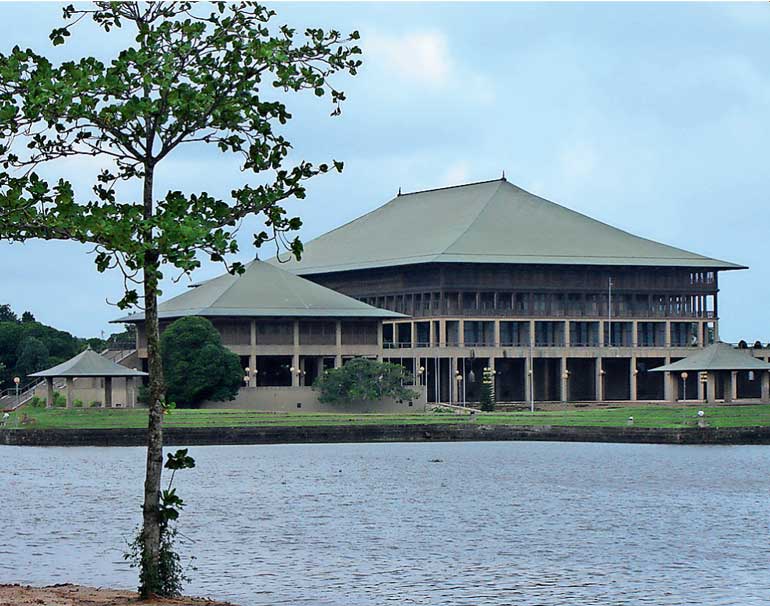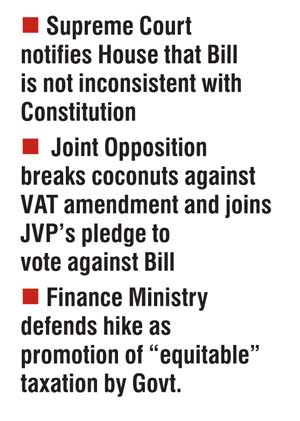Thursday Feb 19, 2026
Thursday Feb 19, 2026
Wednesday, 26 October 2016 00:01 - - {{hitsCtrl.values.hits}}
 By Chamodi Gunawardene
By Chamodi Gunawardene
 On the eve of the VAT Amendment Bill being presented in Parliament today, the Supreme Court determined that the Bill was not inconsistent with the Constitution while the Joint Opposition refused to vote for the fresh legislation.
On the eve of the VAT Amendment Bill being presented in Parliament today, the Supreme Court determined that the Bill was not inconsistent with the Constitution while the Joint Opposition refused to vote for the fresh legislation.
Reading the Supreme Court determination in Parliament yesterday, Deputy Speaker Thilanga Sumathipala said: “I wish to announce to the House that I have received the determination of the Supreme Court in respect to the Value-Added Tax Bill (Amendment), which has been challenged in the Supreme Court through Article 121(1) of the Constitution. The Supreme Court has determined that neither the Bill as a whole nor any of its provisions is inconsistent with the Constitution. I order that the determination of the Supreme Court be printed in the official report of today’s proceedings.”
The Joint Opposition, holding a hurried press conference in Parliament on Tuesday, said they rejected the VAT Bill and would propose that the 15% increase be returned to 11%.
“We also want the Government to give more concessions to patients going to private hospitals and find a way to return the VAT collected ahead of the Supreme Court suspension earlier this year,” said MP Bandula Gunawardene, who earlier in the day broke coconuts in protest over the Bill.
These three points will be presented by the JO as proposals when the House meets today and if the Government fails to absorb them the JO members will not vote in favour of the amendment, Gunawardene stressed.
“We call on all Parliamentarians to put aside their party differences and support us in this endeavour to defeat this Bill,” he added.
The Janatha Vimukthi Peramuna (JVP), which had previously rejected the VAT hike, will be holding a protest rally at parliament grounds this morning against the Bill. The march is expected to start at 10.00 a.m.
Releasing a statement ahead of the VAT presentation in Parliament, the Finance Ministry insisted that it would promote “equitable” taxation in Sri Lanka despite experts insisting that indirect taxes commonly affect the poor disproportionately.
“The previous VAT was against the tax fundamentals, it was not transparent because it included hidden taxes and was charged from only one faction of traders despite others who sell same the goods were not brought under this VAT net. Therefore, the Government has broad based the VAT net through this new VAT Amendment Bill to do justice to the trading community,” the statement said.
The new amendment to the VAT Act, which was moved on 4 October, proposed increasing VAT to 15% from the previous level of 11%. It also includes the reduction of the threshold of registration for VAT from Rs. 3.75 million per quarter or Rs. 15 million per annum to Rs. 3 million per quarter or Rs. 12 million a year.
The imposition of VAT on trade, which sparked much controversy under the previous arrangement, has been amended to Rs. 50 million per annum for both wholesale and retail while a deemed input credit system will be introduced on purchases made from people not registered for VAT.
Private health services other than diagnostic tests, dialysis and OPD services excluding medical consultation will be subject to VAT. Telecommunications, tobacco products, powdered milk containing added sugar and air ticketing fees will all be subject to the VAT increase.
The Cabinet paper submitted by Finance Minister Ravi Karunanayake also included restrictions of VAT exemptions on residential accommodation given to investment projects less than $ 5 million.
“However, such supplies made by Strategic Development Projects approved prior to 1 November 2015 and by State development projects and other projects where the sales agreement was entered into or projects completed before 1 October 2016 will continue to be exempted,” the Cabinet paper said.
Each piece of apparel supplied to the local market by Board of Investment (BOI) registered companies will be charged Rs. 75.
The Central Bank, the International Monetary Fund (IMF) and economists have insisted the VAT increase is crucial to the government’s fiscal consolidation process, which aims to reduce the Budget deficit to improve investment and exports for sustainable growth and tackle debt.